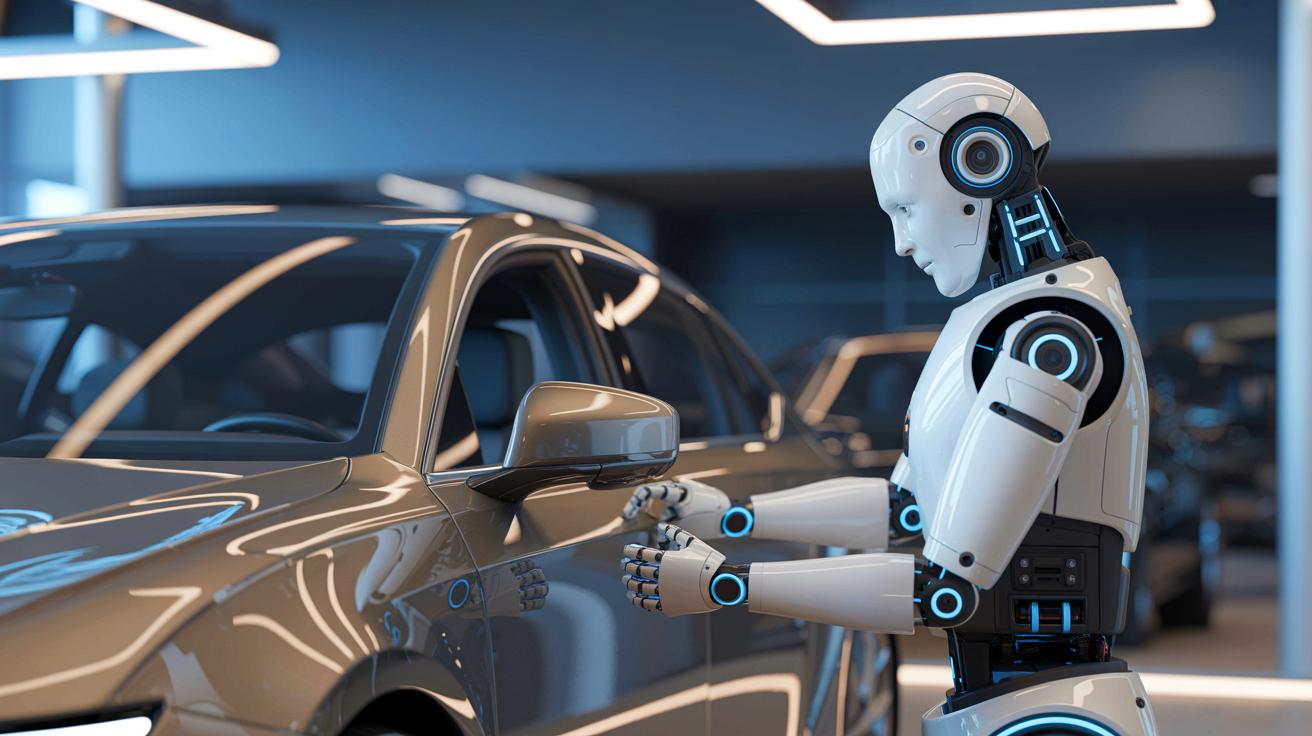- 🚗 Mornine, a humanoid robot by AiMOGA Robotics, autonomously opens car doors without human help, showcasing advanced AI capabilities.
- 🔧 The robot uses an advanced sensor suite and reinforcement learning to perform tasks, marking a shift from simulation to real-world application.
- 🛍️ Originally a virtual character, Mornine has evolved to assist in retail environments, enhancing customer interactions and operational efficiency.
- 🌍 Mornine’s deployment in Malaysia highlights its global reach and the expanding role of AI in international retail markets.
In a significant advancement for robotics and artificial intelligence, AiMOGA Robotics has unveiled its humanoid robot, Mornine, capable of autonomously opening car doors without any human intervention. This development took place at a Chery dealership in China, where Mornine used onboard sensors and advanced motion control to complete the task. The event marks a milestone in the transition from simulation environments to real-world applications, showcasing the potential of robots in commercial settings. This achievement raises questions about the future of robotics in everyday tasks and their integration into various industries.
The Leap From Simulation to Real-World Application
AiMOGA Robotics has propelled its humanoid robot, Mornine, from simulation to real-world service, marking a pivotal moment in the robotics industry. While opening a car door may seem trivial, the task demonstrates a shift towards autonomous capability. Mornine’s ability to independently identify a door handle, adjust posture, and apply the necessary force reflects a significant leap in robotics. The robot relies on a sophisticated sensor suite that includes 3D LiDAR and depth cameras, allowing real-time perception and interaction within its environment.
Unlike traditional robots, Mornine was not pre-programmed to recognize door handles. Instead, it learned through reinforcement learning, undergoing millions of simulated cycles. This approach allowed the robot to focus independently on regions of interest, such as door handles, and perform tasks without explicit instructions. The learned model was then transferred to real-world applications using Sim2Real methods, where Mornine continuously gathers sensor data to improve its performance.
Mornine’s deployment “marks one of the first instances of a service robot executing such a high-friction, physical interaction in a live commercial setting,” the firm stated.
Transforming Retail With AI
Originally conceived as a virtual character, Mornine has become a tangible presence in retail environments, supporting dealership sales through interactive tasks. Chery, the parent company, initially designed Mornine to appeal to Generation Z using metaverse and virtual human technologies. Over time, the concept evolved, leading to the creation of a fully interactive humanoid robot.
AiMOGA Robotics leveraged Chery’s expertise in autonomous driving and environmental sensing to develop Mornine’s capabilities. The robot can interpret user gestures, commands, and showroom dynamics through multimodal sensing, which combines speech, vision, and environmental data. Its bionic motion system, coupled with automotive-grade hardware, enables dexterous movement and upright mobility, making it an effective assistant in retail settings.
In addition to opening doors, Mornine is equipped to assist with customer greetings, vehicle introductions, and item delivery, marking a step forward in humanoid robotics for commercial retail environments. The robot’s deployment highlights the potential for AI integration within the retail sector, transforming customer experiences and operational efficiency.
Implications for the Future of Robotics
Mornine’s introduction into commercial settings raises critical questions about the future role of robotics in society. As robots become more autonomous, the potential applications in various industries expand significantly. Mornine’s ability to perform tasks traditionally executed by humans could lead to a reevaluation of workforce dynamics and job roles across sectors.
The technology behind Mornine showcases the advancements in machine learning and artificial intelligence, emphasizing the importance of continuous learning and adaptation in robotics. As AiMOGA Robotics continues to refine Mornine’s capabilities, the potential for humanoid robots to take on more complex tasks grows.
This development invites further exploration into the ethical considerations and societal impacts of integrating robotics into everyday life. How will industries adapt to the presence of robots like Mornine, and what measures will be necessary to ensure a harmonious coexistence between humans and machines?
Expanding Global Reach
Mornine’s capabilities have not been confined to China alone. In April 2025, Mornine was introduced as an “Intelligent Sales Consultant” at a dealership in Kuala Lumpur, Malaysia. This move marked her transition from a virtual concept to a real-world humanoid sales assistant, demonstrating her potential in international markets.
The introduction of Mornine in Malaysia highlights the global reach of AiMOGA Robotics and its commitment to expanding the role of AI in retail. The robot’s ability to engage with customers in multiple languages and perform a variety of tasks reflects the versatility and adaptability of AI in diverse cultural settings.
As Mornine continues to be deployed in more locations, the potential for humanoid robots to enhance customer experiences and streamline operations in retail settings becomes increasingly evident. This expansion raises questions about the future of AI in global markets and the role it will play in shaping consumer interactions.
The introduction of Mornine by AiMOGA Robotics marks a significant milestone in the integration of humanoid robots into real-world applications. As Mornine continues to develop and expand its capabilities, the implications for the future of robotics and AI in various industries are profound. How will society adapt to an increasingly automated world, and what challenges and opportunities will arise from the growing presence of humanoid robots like Mornine?
This article is based on verified sources and supported by editorial technologies.
Did you like it? 4.7/5 (28)
